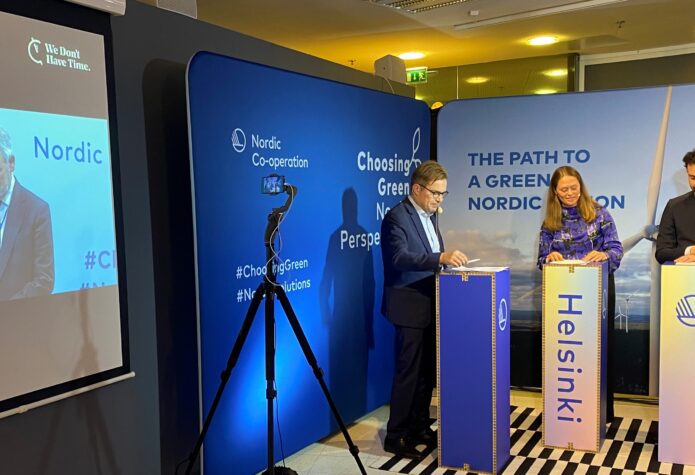NIB Sustainability Policy: A farewell to fossil fuels

“NIB’s updated Sustainability Policy reflects that we are running out of time, and that we really need to step up efforts to decarbonise the energy sector. So, we are taking a very clear stance, we will not finance any fossil fuel-based energy generation,” says Luca De Lorenzo, Head of Sustainability and Mandate at NIB.
“We have built this policy on how we have been operating for some years, and now this has been explicitly formulated,” says De Lorenzo.
The comments were made at the COP26 Nordic Hub in Helsinki on 11 November 2021. NIB, which is owned by the Nordic and Baltic countries, is partnering with the Nordic Council of Ministers for the Helsinki Hub and the Nordic Pavilion in Glasgow. The Nordic Investment Bank is a tangible example of how the Nordic and Baltic countries cooperate on climate issues through long-term sustainable financing.
“The policy reinforces our commitment to the Paris Agreement—let me remind you that it is six years old—and NIB’s support to our Nordic and Baltic member countries in delivering all of the commitments, while contributing broadly to the UN sustainable development goals,“ De Lorenzo says, adding that “the protection of the Baltic Sea and water resources also appears heavily in the policy.”
NIB is a pioneer in sustainable financing. The Bank started environmental analysis of its lending projects already in the mid-90’s. In 2006, the environment became a formal pillar of NIB’s mandate rating analysis. During the last ten years, sustainable financing has developed intensely, which is why also NIB needed to update this important policy.
On 30 September 2021, NIB’s Board of Directors approved an updated Sustainability Policy for a 30-day public consultation period. After having considered comments received from our stakeholders, the new Sustainability Policy entered into force on 11 November 2021. The result is a bank-wide policy defining how sustainability is considered in all NIB’s business conduct, credit, and investment decisions. Previously, the policy was intended for the Bank’s lending operations. You can read NIB’s responses to the public contributions here.
Future growth is green
Ms Julie Sonne, Member of NIB’s Board of Directors, says she believes this to be “an ambitious and workable sustainability policy”.
“It is obvious to everyone that we have a massive task ahead of us if we are to solve the climate crisis, and as an investment bank owned by the Nordic and Baltic countries it is important to do our bit to support the de-carbonisation plans of our member countries,” says Sonne, who is also Head of Division, Ministry of Industry, Business and Financial Affairs in Denmark.
“We believe that a change must come in all the aspects of how we do business in NIB, and this is reflected in the new policy. Specifically, we will not finance energy production based on fossil fuels, or the extraction or production facilities and so on. NIB has operated along these lines for several years, but now this has been formulated in our Sustainability Policy,” Sonne says.
“More importantly, our new policy means that we want to engage even more proactively with our clients, also in other sectors than energy production, to support their transition efforts. While projects like battery plants and wind farms are important, we also want to focus on the hard-to-abate sectors. They are important to reach if we want to transform our societies and create the base for the sustainable growth that we want to achieve,” says Sonne.
Mr Sean Kidney, CEO of Climate Bonds Initiative says he is “excited” about NIB’s Sustainability Policy.
“Limiting global warming to 1.5°C, absolutely correct. No fossil fuels, it makes my heart sing. And knowledge sharing. Why? Because there are 500 development banks in the world and they all need help,” Kidney says, adding that “NIB is becoming a full-fledged climate bank and that is what everyone needs to be.”